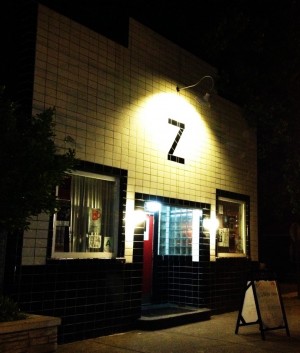Chronicles of the Indie Scene in Louisville, Kentucky: Part I
When I told my Greyhound bus companions that I was headed to Louisville, they looked at me quizzically. “Louisville, Kentucky,” I repeated, pronouncing the town’s name the way the locals do—loouhvull—lips barely parting to make way for the toneless murmuring schwas.
“Oh,” a man said, “You mean Loo-iss-vill!”
“Yes, Loo-ee-vill!!” said a woman, nodding knowingly.
I arrived around midnight as scheduled, despite pronunciation disparities. My friend Trish Feldkamp, a loyal companion since high school and now a nurse at the University of Louisville hospital, was there waiting. Trish is the kind of nurse who wears Star Wars scrubs and spontaneously does the robot to keep the ICU mood up. Just then, she was sporting earrings of miniature origami owls and trendily pointy hair, on her way back from some Demetri Martin stand-up. “It was alright,” she explained. She would have rather gone to Sergio’s (whose approximate 1,400 beer selection holds even the most hardened East Coast snob in check), or to a live show at Headliners, or even one of the myriad hotspots of Louisville nightlife that I was to get a taste of that weekend.
Kentucky, even to a fellow ruralite Midwesterner such as myself, is considered in the youthful popular imagination as a kind of horse-loving, backwater state, its uncultured monotony interrupted only by the annual Kentucky Derby’s aggregation of extravagant hats, and various local festivals dedicated to the imbibing of quality bourbon. Officially the “Commonwealth of Kentucky” (look it up if you don’t believe me), the home of such personalities as Hunter S. Thompson, Johnny Depp, and Colonel Sanders is a member state of the American south, as the accents will prove, if you happen to forget. It is spotted with dry counties, moist counties, and wet counties — respectively: those which prohibit the sale of alcoholic beverages, allow it in some cities, and allow it generally.
Louisville, the largest city in Kentucky at over a million in the metropolitan area, lies at about the center of the state’s squiggly northern border, two hours directly under Indianapolis and a bit less west from Cincinnati. Driving down Bardstown Road — Louisville’s throbbing heart — that night, I caught a glimpse of bar goers making merry, couples exiting dark restaurants in tailored coats, and late-night dog walkers. There was a Hopper-ish yellow-lit diner but with younger, more joyous people drinking European coffee as well as a succession of illuminated shop windows that flashed by, showing guitars and record covers, secondhand books, and mannequins in vintage feather dresses.
“How many people live in Louisville?” I asked Trish, surprised at the stretch of activity late on a weekday night.
“You know, I just moved here. I couldn’t even tell you,” she replied. “But honestly, it sure seems big enough.”
Beer Cheese
Trish and I had scheduled two indispensable appointments for each day of my stay, and those were breakfast and lunch in one, followed by a well-portioned dinner. Though Kentucky is not known for eclecticism or global variety in its cuisine, the dining scene in Louisville is vibrantly independent, with emphasis on innovative ingredient-based menus and farm-to-table approaches. One of the top culinary schools in the nation is located in town, which has prompted a surge of new culinary arrivals. Count the Mayan Café among one of the most unique dining options, recreating authentic indigenous Mayan flavors with local produce. Harvest, a solid local presence, puts out a seasonal menu of fresh regional fare exacting the highest standards of quality and sustainability from its food sources. Even the restaurant’s décor is acquired locally; much of it is reclaimed material from the city. In a gesture that includes and embraces alternative food movements, both offer well-labeled vegetarian, vegan, and gluten-free dishes. In the days to come, I would notice this on many of Louisville’s menus, of which I am duly appreciative, knowing how difficult it can be to choose a restaurant that satisfies everyone in a group with differing levels of omnivorous palates.
I decided to begin my restaurant binge with samplings at somewhat humbler locales than the above — though it must be said that neither the Mayan Café nor Harvest, or even most of Louisville’s top-notch independent restaurants, will break your bank. The upcoming Beer Dinner at Harvest (which was, by the way, named a James Beard Foundation “Best New Restaurant” semifinalist — a very big deal in the culinary world) will set you back only $45 for four courses and matching beer. For brunch, then, we made straight for Toast on Market, where I hesitated between the red velvet or lemon soufflé pancakes as Trish reminisced greedily over the gingerbread pancakes sold during the holiday season.
(Article continued on next page)

